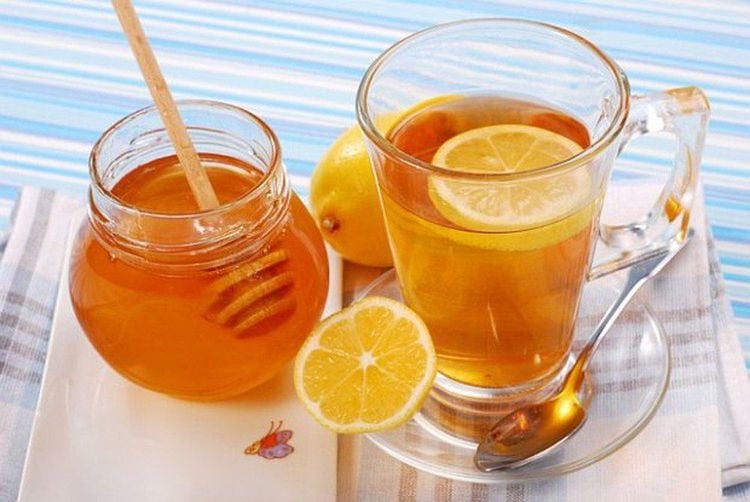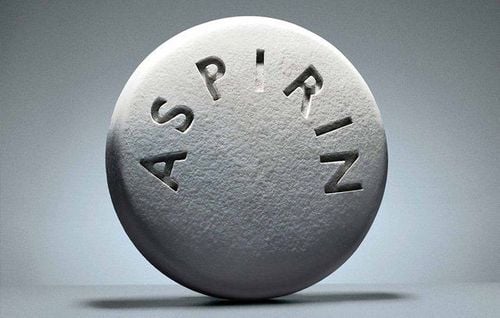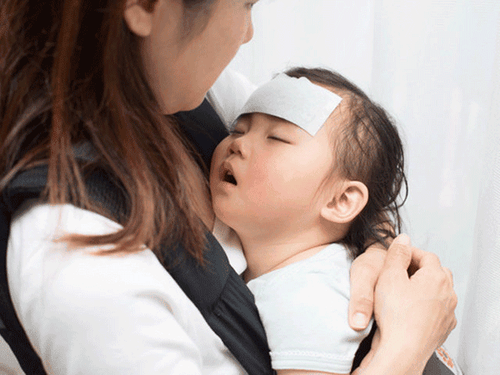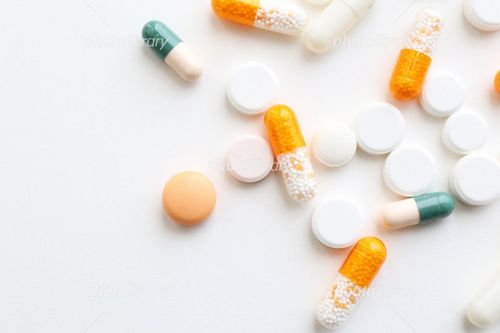This is an automatically translated article.
Because the immune system of newborns is immature, easily attacked by viruses, colds are easy to encounter. Most colds are mild and usually clear up on their own in about 2 weeks. However, in a few cases, children are still at risk of dangerous complications such as pneumonia, acute respiratory infection,...
1.Children have cold symptoms
The most common cold symptom in children is a stuffy or runny nose. Nasal discharge may be clear at first, then may thicken, turning gray or yellow-green. In addition, the child will have a mild cough, fever, fussiness, little or no feeding due to nasal congestion,...
To distinguish a child's cold from some other diseases such as flu, pneumonia, parents please Observe children's behavior. If your baby has a runny nose, cough, and mild fever but is playing and feeding normally, he or she may have a cold. If your child has the flu, in addition to the symptoms of a common cold, your child may experience chills, vomiting, and diarrhea. If your child has pneumonia, symptoms include tremors, chills, flushed skin, high fever, difficulty breathing, hoarseness, coughing a lot,...
2. How long do colds in babies last?
When a child has a cold, symptoms will usually peak on the second or third day of the child's first symptoms, then the symptoms will gradually improve and go away in 10 days to two the week.
If your child's cold symptoms last a few weeks or his or her symptoms get worse instead of improving, take your child to see a doctor.
3. Measures to help alleviate cold symptoms in children?

Mật ong giúp giảm ho nhưng tuyệt đối không được sử dụng cho trẻ dưới 1 tuổi
The cause of colds in 1 month babies and infants is usually caused by a virus, so the common cold is also known as an upper respiratory viral infection. The disease is not caused by bacteria, so it does not respond to antibiotic treatment.
There is no medicine that makes the virus go away faster. Treatments are aimed at helping the infant feel more comfortable and at ease, and at the same time preventing a possible bacterial superinfection. Measures that can be taken are:
Give the child plenty of rest and provide plenty of fluids. For infants, give plenty of breast milk or formula if the baby is not breastfed. Drop the nose with physiological saline to help the child breathe easier. If the mucus in the nose is too much, the mother can use a nasal aspirator for the child. Use a humidifier to keep the noise in the air. An important note is that although honey is often used to help relieve coughs, parents absolutely should not use it for children under 1 year old. In honey, there are many botulinum spores that can cause poisoning in children.
4. Are over-the-counter (OTC) cough and cold medicines safe for children?

Cho trẻ uống Aspirin có thể gây nguy cơ trẻ mắc hội chứng Reye
As recommended by the American Academy of Pediatrics, cough medicine and other cold medicines should not be given to children under 4 years of age. Because these drugs have not been proven to be effective and safe for children. On the other hand, drugs can cause dangerous side effects.
If the child has a fever and is irritable, fussy, parents should consult the doctor about giving the child Paracetamol (if the child is at least 3 months old) or Ibuprofen (if the child is at least 6 months old). Parents absolutely should not give aspirin to children because it can put children at risk of Reye's syndrome, which is a rare but extremely serious complication that can be life-threatening.
5. Is a cold in babies dangerous? When should a child see a doctor?
Colds are common in children, especially children under the age of 5. Newborns often get colds because their immune systems are still immature and vulnerable to viruses that cause illness. Besides, in the process of developing and exploring the world around, children's hands are very easily exposed to viruses, the movements of putting infected fingers into the mouth, nose, rubbing eyes create favorable conditions for the virus to cause infection. invasive disease. Colds in 1-month-olds and infants in general usually appear in the fall and winter months because these are the times when cold viruses thrive.
Có một số trường hợp gặp các biến chứng viêm phổi do bị cảm lạnh
Are colds in babies dangerous? In fact, most colds in children are mild and will go away on their own, but there are still rare cases of complications such as acute ear infections, asthma attacks, sore throats, sinusitis, pneumonia. ,... Parents should see a doctor when their child has the following signs:
For colds in babies 1 month and children under 3 months, take your child to the doctor as soon as the first signs of illness appear. , especially when the child's rectal temperature is 38 degrees Celsius or higher.
For children 3 months and older, parents should take the child to the doctor if the child has cold symptoms and the following signs:
Children aged 3-6 months with a rectal temperature of 38.5 degrees Celsius above. Children 6 months or older, rectal temperature above 39.5 degrees Celsius. Cold symptoms that are getting worse or symptoms that do not improve after a week. Children with severe cough Diarrhea, vomiting Crying, loss of appetite Parents also need to take the child to the doctor if the child has a cold accompanied by symptoms such as: The child shows signs of dehydration such as the diaper has not been wet for more than 6 hours; Signs of an ear infection such as the child frequently picking his or her ear or having fluid drain from the ear; There are symptoms of conjunctivitis, red eyes, eye discharge,...
6. When to take a child with a cold to the emergency room?

Trẻ bị cảm lạnh cần đi cấp cứu ngay nếu trẻ có triệu chứng suy hô hấp cấp
If an infant has a cold with the following signs of acute respiratory failure, parents should quickly take the child to the nearest medical facility's emergency department for timely intervention:
The child's skin becomes pale fast; The child breathes faster than 60 beats per minute, the nostrils rise and fall when breathing; Child wheezing, coughing or wheezing Sunken fontanelle (the fontanel is a soft spot on a child's head) The child doesn't wake up, isn't exposed, or shows signs of severe dehydration.
7.Measures to reduce the risk of children catching colds
To reduce the risk of children catching a cold, strengthen the following good habits:
Hand wash with soap: Hand washing is an extremely effective measure to prevent diseases caused by viruses and bacteria. out, including colds. Family members should wash their hands with soap before taking care of the child. Also, don't forget to wash your hands after changing diapers and before preparing food for your baby. Keep children away from people who are sick, especially people with respiratory problems. Instruct family members to cover their coughs or sneezes, not to cough or sneeze when near the child.. Breastfeed or bottle-feed frequently, so that the child does not become dehydrated.

Hãy rửa tay sạch sẽ bằng xà phòng trước khi chăm sóc trẻ giúp giảm thiểu nguy cơ trẻ bị cảm lạnh
Keep children's sleeping areas, play areas and toys clean. Keep children away from smokers. Studies have shown that children living with smokers have more colds and last longer than children who are not exposed to secondhand smoke. Breastfeed your baby for as long as possible. Breastfed babies are less likely to get sick than formula-fed babies because the antibodies in breast milk help protect them against many types of germs. In addition, parents need to have their children fully vaccinated according to the schedule. Vaccinations may not protect children from colds, but they can help prevent superinfection with bacteria that cause serious infections.
Currently, the International General Hospital has a full range of necessary vaccinations for young children. Accordingly, to protect health and avoid the risk of serious diseases, it is extremely necessary to be fully vaccinated with all types of vaccines.
Customers who choose to get vaccinated at Vinmec will be completely assured of the quality of the vaccine as well as the implementation process, because:
The injector is fully examined and screened by a specialist doctor. health and fitness, advice on preventive vaccines and injection regimens, monitoring and post-vaccination care. 100% of vaccinated customers are monitored 30 minutes after injection and reassessed before leaving. Undertake medical supervision before, during and after vaccination at Vinmec Health System and always have an emergency team ready to coordinate with the vaccination department to handle cases of anaphylaxis, respiratory failure - circulatory arrest, ensuring Ensure timely and correct handling when incidents occur. The vaccination room is airy, with a play area, helping children feel comfortable as if they are walking and have a good mentality before and after vaccination. Vaccines are imported and stored in a modern cold storage system, with a cold chain that meets GSP standards, keeping vaccines in the best conditions to ensure quality.
Please dial HOTLINE for more information or register for an appointment HERE. Download MyVinmec app to make appointments faster and to manage your bookings easily.
Reference source: babycenter.com












